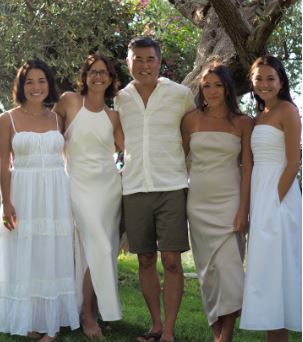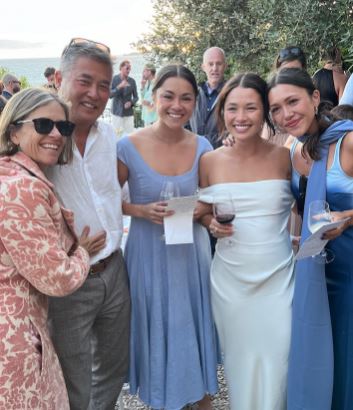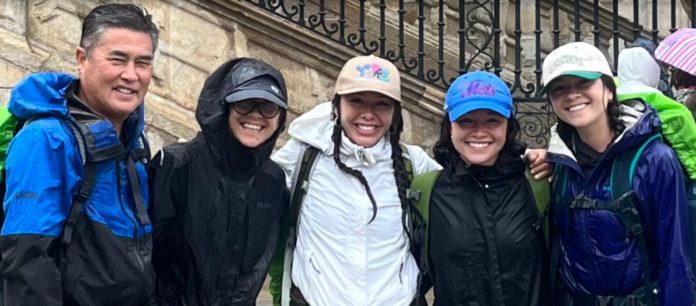‘
By Rachel Lu
(This story is made possible by the financial support of AARP)
Three years ago, Doug Inamine and his wife Nicole had just moved to Korea when Nicole lost five credit cards in the span of six months. Frustrated after repeatedly requesting replacement cards, the Inamines began seeking out possible explanations for Nicole’s sudden tendency for losing things.
“Originally, we thought it was long covid. We thought it was a midlife crisis. We thought it was menopause,” said Inamine. “[We thought of] all these potential chemical and other environmental things that are happening that were causing some of her lack of words and completing thoughts.”
The couple, in their mid-fifties at the time, were shocked to learn that Nicole had early on-set Alzheimer’s. Nicole’s loss of words is a condition known as aphasia, which is a common symptom for Alzheimer’s disease.
Adapting to Life with Alzheimer’s
With Nicole facing a terminal illness, Inamine decided to retire early so the couple can instantly begin living the life they had envisioned for themselves five to eight years in the future.
“Within six months after she was diagnosed, we basically made that decision that we’re just gonna live every day and live our lives and enjoy as much as we can, and primarily with our family and friends,” Inamine told AsAmNews.

Before grief over the disease had a moment to catch up with the Inamines, they were ready to get on with life. They walked the Camino de Santiago in Spain with 15 friends and family members, after being inspired by the movie The Way; they renewed their vows after being married for nearly 30 years, surrounded by loved ones in Italy.
“It’s not that life is short or any of that, I know those are cliches, but it’s so unpredictable and just more reason to not waste the time,” said Inamine.
A Bigger Family
While Inamine didn’t originally see himself as a caregiver to his wife, Nicole’s Alzheimer’s progressed and his responsibilities became increasingly demanding. According to the Alzheimer’s Association, Inamine is one of 11 million Americans who are providing unpaid care for people with Alzheimer’s or other dementias. Doing things independently, for both Inamine and Nicole, has become much more difficult.
Delaney Inamine, the eldest of the three Inamine sisters who are in their early twenties, said part of the difficulties of the disease is watching her dad carry out the full-time job of caregiving that is relentless and exhausting. Unexpectedly, the experience brought her and her sisters closer to her dad, who can no longer lean on Nicole in these situations.
Delaney recalls six years ago, when the Inamines were planning their move to Korea, the three sisters had cried at the possibility of leaving behind the family dog in California. Inamine, who’s often confused and frazzled by his daughter’s emotional expressions, would often reach for Nicole’s help.
Now, Inamine relies on his daughters directly when he needs support. “He would ask [my mom] these very innocent questions around our feelings, and he can’t do that anymore,” said Delaney. “So he’ll now ask us, and he’ll now be pretty direct when he needs help, or when he doesn’t understand something.”
The importance of supportive networks was certainly reinforced by the diagnosis. At times, Inamine said their circle of friends have gotten smaller, as some found dealing with disease difficult. On the other hand, Inamine likes to say: “my circle of real family is becoming bigger.”
As a caregiver, Inamine’s found people who he can lean on, from existing family to support groups at the Alzheimer’s Association.
Seeking Care After the Diagnosis
Within the AAPI community, a cultural responsibility to take care of your family members, coupled with the stigma associated with the disease, pose challenges for those affected to receive proper care and support.
Benson Zhao is a Community Engagement Manager with the Alzheimer’s Association focusing on the Chinese community as well as other Asian population groups, primarily for the Greater Bay Area. Zhao observed that compared to other ethnic groups, across the AAPI demographic, they are more likely to take care of their own family members.
“This is a good thing,” Zhao told AsAmNews. “Then the bad thing is they are facing these things in isolation, in their own little families, and they don’t want to ask for help.”
In Chinese, the term for dementia is closely associated with “crazy old person.” As a result, Zhao said the diagnosis triggers a lot of negative responses within the Chinese community, which leads to patients who are reluctant to recognize the disease, ultimately ignoring early warning signs and unwilling to reach out for help. Some don’t even want to discuss the disease with their own doctors.
Inamine, who is ethnically Japanese, said the responsibility of taking care of one’s elders was not a prominent part of his cultural upbringing. Delaney said both of her parents have expressed that her and her sisters should live their lives.
When Inamine’s three daughters first heard about Nicole’s diagnosis, their immediate reactions were to come home and help. Inamine pushed back, insisting that they should focus on their lives that were just beginning.
“That’s the best way that we can take care of them,” said Delaney. “Until there needs to be a point where we come home. And he’s always said, he’ll tell us when we need to come home, and right now, it’s not the time.”
A Misunderstood Disease
Delaney admitted that when her mom was first diagnosed, she knew very little about Alzheimer’s.
“I didn’t know that you would die from the disease. And frankly, most people that I speak to don’t understand that,” Delaney told me.
Properly educating the public is at the core of the Alzheimer’s Association’s mission, Zhao said exposure to information about the disease, for those who are affected and for the general public, can help reduce stigma around Alzheimer’s.
It’s especially important for younger people to be aware of the early warning signs of cognitive decline, as they are usually the ones who can recognize the symptoms of those affected and take proper action.
For Inamine, raising awareness for Alzheimer’s is also an effort to fundraise cutting-edge research in order to find a cure for the disease. Inamine says proudly that Nicole is a scientist and educator with a PhD from Stanford University, her background has given her the firm belief that finding a cure requires proper science.
“In order to get the science, you need research, and to research, you need funding. And so that’s why, what we do now is just help out with any fundraising to share,” said Inamine.
A cure is close, Inamine believes, while it certainly will not help Nicole, he is hopeful that it will have an impact on his children.
Hopes and Dreams
Delaney recently got married in France last month. After being engaged earlier this year, Delaney was originally set on getting married next year. However, her dad convinced her to move the big day up, as this would likely be the only wedding of Nicole’s three daughters where she will be able to participate in fully.
“My dad was pretty frank with me and was like, I think you’ll really regret that, because I don’t think that your mom will be able to appreciate it in the same way if you continue to wait for all of these milestones or bullet points [before getting maried],” said Delaney.
So she decided to have the wedding. Her perspective on life has changed as a result of her mom’s diagnosis, including letting the little things go, like her dad worrying about her mom’s dress at the wedding – it doesn’t matter.
Inamine knows the most difficult stages of Nicole’s Alzheimer’s are still on the horizon. When I asked Inamine what his biggest hopes are at the moment, he told me: “just for my wife to see as much of her kids’ lives and for my girls to see as much of their mom as possible”.”
AsAmNews is published by the non-profit, Asian American Media Inc.
We’re now on BlueSky. You can now keep up with the latest AAPI news there and on Instagram, TikTok, Facebook, YouTube and X.
We are supported by generous donations from our readers and by such charitable foundations as the Robert Wood Johnson Foundation.
You can make your tax-deductible donations here via credit card, debit card, Apple Pay, Google Pay, PayPal and Venmo. Stock donations and donations via DAFs are also welcomed.


